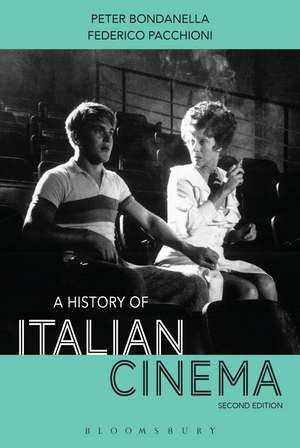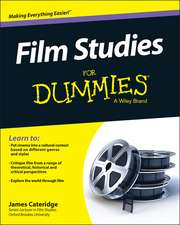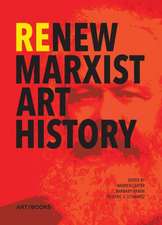A History of Italian Cinema
Autor Dr Peter Bondanella, Professor Federico Pacchionien Limba Engleză Paperback – 29 noi 2017
Preț: 254.74 lei
Preț vechi: 281.64 lei
-10% Nou
Puncte Express: 382
Preț estimativ în valută:
48.74€ • 51.03$ • 40.33£
48.74€ • 51.03$ • 40.33£
Carte disponibilă
Livrare economică 15-29 martie
Preluare comenzi: 021 569.72.76
Specificații
ISBN-13: 9781501307638
ISBN-10: 1501307630
Pagini: 752
Ilustrații: 150 bw illus
Dimensiuni: 152 x 229 x 48 mm
Greutate: 1.2 kg
Ediția:2
Editura: Bloomsbury Publishing
Colecția Bloomsbury Academic
Locul publicării:New York, United States
ISBN-10: 1501307630
Pagini: 752
Ilustrații: 150 bw illus
Dimensiuni: 152 x 229 x 48 mm
Greutate: 1.2 kg
Ediția:2
Editura: Bloomsbury Publishing
Colecția Bloomsbury Academic
Locul publicării:New York, United States
Caracteristici
Brings the best-selling edition up to date, with coverage of films, movements and directors of the last decade, including more on melodrama, stars and popular films
Notă biografică
Peter Bondanella is the author of a number of groundbreaking books such as: Hollywood Italians, The Cinema of Federico Fellini, and The Films of Roberto Rossellini. In 2009, he was elected to the European Academy of Sciences and the Arts for his contributions to the history of the Italian cinema and his translations or editions of Italian literary classics (Dante, Boccaccio, Machiavelli, Vasari, Cellini). He was Distinguished Professor Emeritus of Comparative Literature, Film Studies and Italian at Indiana University Bloomington, USA.Federico Pacchioni is Sebastian Paul & Marybelle Musco Chair of Italian Studies at Chapman University, Orange, California, USA. In his research, he focuses on cases of artistic synergy and intermediality across Italian cinema, literature, and theatre. He is the author of numerous articles and of the monograph Inspiring Fellini: Literary Collaborations behind the Scenes (2014).
Cuprins
PrefaceAcknowledgement1. An Ancient Cradle for a Newborn Medium: The Rise of Silent Cinema in Italy 2. Industry and Ideology: The Talkies during the Fascist Era 3. Neorealism: A Revolutionary and Problematic ?New Film Aesthetic 4. Neorealism's Many Faces: Widening the Range of the Camera's Eye 5. The Cinema of the Reconstruction and the Return of Melodrama 6. Entertainment on an Epic Scale: The Italian Peplum 7. Commedia all'italiana: Social Criticism for Laughter's Sake 8. The Italian Art Film: Auteurism in Visconti, Antonioni, Fellini, and De Sica 9. Neorealism's Legacy to a New Generation, and the Italian Political film 10. Myth, Marx, and Freud in Pier Paolo Pasolini and Bernardo Bertolucci 11. The Spaghetti Nightmare: The Heyday of Italian Horror Films 12. A Fistful of Pasta: Sergio Leone and the Spaghetti Western 13. Mystery, Gore, and Mayhem: The Italian Giallo 14. The Poliziesco: Italian Crime Films from the 1970s to the Present 15. Italy's Truly Popular Genre: Tragicomedy from the 1980s to the Present 16. A Fellinian Ascendant: The Auteur in Contemporary Italian Cinema 17. Weaving Present and Past: The Contemporary Italian Drama Notes Bibliography List of photo credits Index
Recenzii
By reconfiguring and expanding upon Bondanella's original work, both authors have ensured that A History of Italian Cinema remains relevant and necessary as Italy's cinemascape continues to evolve. It is, therefore, a piece of scholarship akin to that which it describes, adapting to waves of the present while grasping to the roots of its past.
Peter Bondanella's masterly A History of Italian Cinema was a monument to a lifetime of passionate scholarly engagement with the films and film-makers of the peninsula. This second edition, revised and expanded with Federico Pacchioni, integrates new themes and takes full account of the latest approaches to the history of Italian cinema. It will be an indispensable reference work for academics, students and general readers for years to come.
This new edition of History of Italian Cinema is the most comprehensive, insightful and appealing book on the subject. Ideal for teaching a variety of courses and levels, and well-suited for a general reader, "History of Italian Cinema" will remain the gold standard in a crowded field for years to come.
In this expanded, updated version, A History of Italian Cinema reclaims its status as the foremost English language work on the history of Italian film. Written in a clear and compelling style, balancing vast coverage with vivid sketches of individual films, this book provides an indispensable resource for scholars and film buffs eager to enrich their knowledge of this grand, and ever vital cinematic tradition.
This extensively revised edition of the classic English-language history of Italian cinema reads like a completely fresh work. Clearly written, it takes the reader from the beginnings of cinema to the most recent developments, covering everything from neorealism and art cinema to popular genres like the giallo, horror and comedy and combining a broad overview with detailed analyses of individual films. Lavishly illustrated and with an up-to-date bibliography, this book is the essential guide to the subject for students, specialists and general readers.
Peter Bondanella's masterly A History of Italian Cinema was a monument to a lifetime of passionate scholarly engagement with the films and film-makers of the peninsula. This second edition, revised and expanded with Federico Pacchioni, integrates new themes and takes full account of the latest approaches to the history of Italian cinema. It will be an indispensable reference work for academics, students and general readers for years to come.
This new edition of History of Italian Cinema is the most comprehensive, insightful and appealing book on the subject. Ideal for teaching a variety of courses and levels, and well-suited for a general reader, "History of Italian Cinema" will remain the gold standard in a crowded field for years to come.
In this expanded, updated version, A History of Italian Cinema reclaims its status as the foremost English language work on the history of Italian film. Written in a clear and compelling style, balancing vast coverage with vivid sketches of individual films, this book provides an indispensable resource for scholars and film buffs eager to enrich their knowledge of this grand, and ever vital cinematic tradition.
This extensively revised edition of the classic English-language history of Italian cinema reads like a completely fresh work. Clearly written, it takes the reader from the beginnings of cinema to the most recent developments, covering everything from neorealism and art cinema to popular genres like the giallo, horror and comedy and combining a broad overview with detailed analyses of individual films. Lavishly illustrated and with an up-to-date bibliography, this book is the essential guide to the subject for students, specialists and general readers.







